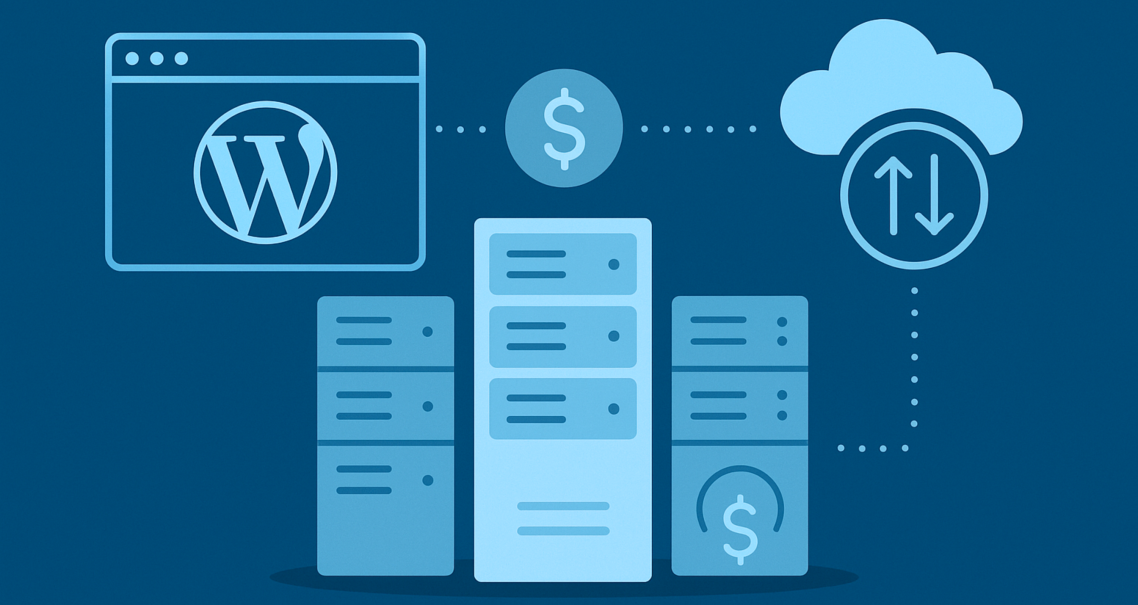
Hosting Matters: How to Pick the Right Plan for a Fast WordPress
Your WordPress host is the foundation of your site. No matter how well you optimize images or fine-tune plugins, poor hosting can drag everything down. A fast server improves Time to First Byte (TTFB), helps pages load quickly, and creates a smoother experience for visitors.
Choosing the right hosting plan isn’t always straightforward. Shared, VPS, managed, and cloud options all promise performance, but they deliver very different results. This guide breaks down what really matters when picking a host and when it’s worth upgrading resources.
Types of Hosting Explained
Shared Hosting
-
Cheapest option, many sites share the same resources.
-
Limited CPU and memory per site.
-
Fine for small blogs or starter projects, but often struggles with traffic spikes.
VPS (Virtual Private Server)
-
More control and dedicated resources than shared.
-
Better performance and scalability.
-
Requires some technical knowledge for server setup and security.
Managed WordPress Hosting
-
Built specifically for WordPress with optimizations included.
-
Hosts like Kinsta or WP Engine offer staging environments, backups, and caching.
-
More expensive but removes much of the technical burden.
Dedicated Servers
-
Full physical server to yourself.
-
Best for very high-traffic sites, but usually overkill for small businesses.
Why Server Resources Matter
Your hosting plan determines how much CPU, RAM, and disk speed your site can use. These directly affect TTFB.
-
CPU handles the processing of PHP and queries. More cores = faster execution.
-
RAM stores temporary data and helps handle multiple requests.
-
Storage matters too: NVMe SSDs are faster than traditional SSDs, which are faster than spinning disks.
-
Bandwidth ensures enough capacity for high traffic.
Even a small upgrade, such as moving from one to two CPU cores, can improve performance significantly when paired with good caching.
Comparing Popular Hosts
Kinsta
-
Managed WordPress hosting built on Google Cloud.
-
Includes automatic scaling, CDN integration, and staging.
-
Higher pricing, but excellent for agencies and ecommerce.
Cloudways
-
Flexible VPS management platform that lets you choose providers like DigitalOcean or Vultr.
-
Pay-as-you-go pricing and ability to resize servers easily.
-
Great balance of performance and cost, though setup is less beginner-friendly.
WP Engine
-
Long-standing managed host with strong developer tools.
-
Security and caching built-in, reliable support.
-
Slightly less flexible than Cloudways in server choices.
Server Stack Options
Not all web servers are equal.
-
Apache is common but less efficient under high traffic.
-
Nginx handles concurrent requests better, especially with FastCGI caching.
-
LiteSpeed is extremely fast and integrates with LiteSpeed Cache for WordPress.
Choosing a host that supports Nginx or LiteSpeed usually results in better performance out of the box.
Picking the Right Droplet Size on Cloudways
If you use Cloudways, you’ll need to choose a server size. Guidelines:
-
Small blogs or portfolio sites: 1 GB RAM, 1 CPU core is enough.
-
Medium business or WooCommerce store: Start with 2–4 GB RAM, 2 CPU cores.
-
High-traffic sites: 8 GB+ RAM, 4+ CPU cores, depending on plugins and traffic.
The advantage of Cloudways is scalability. You can start small and resize your droplet as traffic grows, often without downtime.
When to Upgrade Hosting
It’s easy to blame hosting for a slow site, but not all issues come from the server. Before upgrading:
-
Optimize images and enable caching.
-
Audit plugins to remove unnecessary load.
-
Enable a CDN to reduce latency for global visitors.
If TTFB remains high after these steps, it’s time to upgrade. Signs you need more resources include:
-
Slow performance even with caching enabled.
-
Consistent CPU usage above 80%.
-
Traffic spikes causing downtime.
-
WooCommerce stores with frequent cart or checkout slowdowns.
Using CDNs and Edge Caching
A Content Delivery Network (CDN) distributes your site’s assets to servers around the world. This reduces distance and speeds up delivery.
Cloudflare’s APO (Automatic Platform Optimization) goes further by caching full pages at the edge, even dynamic content. Pairing APO with good server caching often delivers the best performance for WordPress.
Hosting is not just about storage and price. It’s about giving your WordPress site the resources it needs to perform well.
Shared hosting may work for a personal blog, but businesses and ecommerce stores benefit from VPS or managed solutions. Cloudways, Kinsta, and WP Engine each have strengths, and choosing between them comes down to budget, technical comfort, and growth plans.
Start small, optimize your site, and only upgrade hosting when you’ve ruled out other bottlenecks. A fast host combined with smart optimization ensures your visitors see a site that loads quickly and feels reliable — and that is the foundation of online success.



